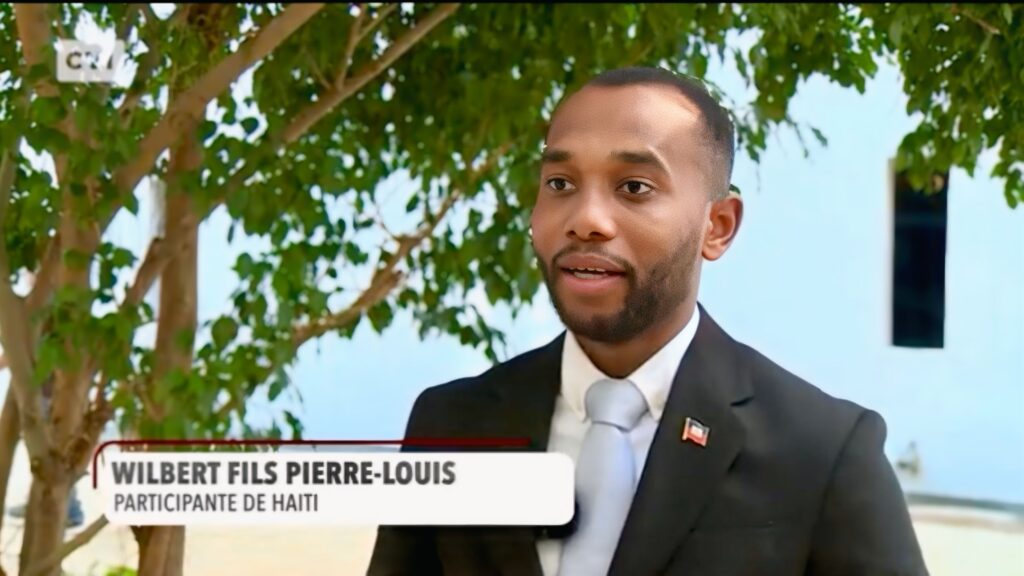From Doha to Havana: Georgetown Student Wilbert Fils Pierre-Louis Advances Cultural Diplomacy on the Global Stage

When Wilbert Fils Pierre-Louis stepped onto the stage in Havana at the “International Seminar on Cultural Diplomacy,” he wasn’t just presenting a paper; he was carrying Haiti’s legacy and Georgetown University in Qatar’s commitment to global citizenship.
A third-year student of International Affairs at GU-Q, Wilbert traveled to Cuba to participate in the diplomacy seminar hosted by the Instituto Superior de Relaciones Internacionales (ISRI), Cuba’s premier diplomatic academy. His paper, “Beyond Borders: Haiti’s Cultural Diplomacy and Its Global Impact,” was among a select few accepted for presentation.
“I felt like I was representing more than myself,” Wilbert said. “I was speaking on behalf of a country often misrepresented, and a university that pushes students to think beyond boundaries.”
In his presentation, Wilbert argued that Haiti’s revolutionary history, rich artistic heritage, and vibrant diaspora are untapped resources in reshaping the country’s global image, proposing a model for Haiti to leverage cultural assets as a tool for strategic diplomacy.
Media Interview
Wilbert’s insights and passion for cultural diplomacy also caught the attention of national media. During the seminar, he was interviewed by Cubavisión Internacional, one of Cuba’s leading international television channels. His comments, broadcast across the region, touched on the growing role of emerging technologies like AI in shaping global narratives and strengthening soft power.
“It was surreal,” Wilbert reflected. “To be asked to speak on Cuban national TV showed me that ideas matter, even across languages and systems.”
Preparation for Success
Wilbert’s insight into Haiti’s cultural diplomacy emerged from research for his Culture and Politics major and his hands-on experience as an intern at the Embassy of Haiti in Qatar. He credits the course Cultural Diplomacy: Policy and Practice as foundational to his thinking.
“Dr. Nadine Ghamloush, professor of Diplomacy and the Art of Negotiation, always emphasized connecting the classroom to the real world,” he said. “That mindset shaped this research.”
Wilbert’s academic focus blends international relations, history, and cultural analysis, a combination he says prepared him to write and defend the ideas in his paper.
“I want my work to connect lived experience with academic inquiry,” Wilbert said. “Diplomacy isn’t just what happens between governments, it’s also what happens between people.”
Diplomacy in Practice
While in Cuba, Wilbert also had the meaningful opportunity to reconnect with his former mentor from the Embassy of Haiti in Qatar, Vichy De La Fayette Thibeaud, who now serves as Interim Chargée d’Affaires. During his internship in Qatar, Wilbert gained essential knowledge and insight for his research by shadowing Ambassador Thibeaud’s work supporting Haitian expatriates and representing Haiti at cultural exhibitions.
“Seeing my mentor in Cuba was a full circle moment,” said Wilbert. “We talked about her current work organizing dialogue and facilitating academic exchange, and she reminded me that diplomacy isn’t just about statecraft, it’s about showing up, being present, and creating meaningful partnerships over time.”
Wilbert also had a chance to tour the city’s museums and historic neighborhoods, thanks to his embassy hosts. “Havana itself felt like a museum,” he said. “Every corner had sculptures, murals, or some visual story being told. One Cuban student told me, ‘Our streets teach history more than our books.’ That stuck with me.”
Looking Ahead
Wilbert is now back in Doha, applying what he learned in Havana to ongoing research and continuing to explore diplomacy, cultural policy, and international cooperation.
“This experience made me realize that youth can lead in redefining diplomacy,” he said. “We’re not just preparing for the future, we’re already shaping it.”
Now celebrating its 20th Anniversary in Qatar, GU-Q is committed to preparing the next generation of research-informed leaders and decision-makers.